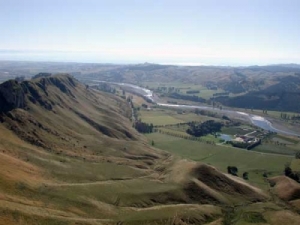Silt Recovery Taskforce wins national award
Hawke’s Bay’s Silt Recovery Taskforce has received the Collaboration Excellence Award at the Association of Local Government Information Management (ALGIM) Awards.
 This month's decision by the Hawke's Bay Regional Council confirming its intention to invest in the Ruataniwha water storage scheme is a good one.
This month's decision by the Hawke's Bay Regional Council confirming its intention to invest in the Ruataniwha water storage scheme is a good one.
This month's decision by the Hawke's Bay Regional Council (HBRC) confirming its intention to invest in the Ruataniwha water storage scheme is a good one.
HBRC's plan to invest $80 million follows the signing of water user agreements by at least 190 farmers who support the scheme.
As Federated Farmers Hawke's Bay provincial president Will Foley says: "The Ruataniwha Plains are highly vulnerable to drought and this dam will ensure a reliable water source to preserve the family farming traditions in the region."
Water storage and irrigation are the future for sustainable and prosperous agriculture in New Zealand – particularly in drought-prone regions like Hawke's Bay. And there are economic and environmental benefits for the wider community. Irrigation supported by water storage will allow growers, farmers and the whole region to ride out global market ups and downs and climatic stresses like droughts.
Despite what the doomsayers and supposed environmental lobbies claim, irrigation schemes benefit more than just irrigators; they provide economic certainty for communities and bolster their environments. Examples of this are dotted throughout the country. It simply makes good economic and community sense for local government to invest in irrigation schemes.
In its recent submission on the next steps in fresh water management, Irrigation NZ correctly pointed out this fact as follows:
'An irrigator's business is founded on certainty. This includes access to a reliable water supply for irrigation and the ability to dynamically farm their land. It is this certainty that enables investment and continuous improvement in resource use efficiency and thus good environmental performance. Without certainty they and the considerable flow-on benefits to the regional economy are severely impacted. The national economy would also be affected, given NZ has predominantly an agricultural export based economy."
IrrigationNZ chief executive Andrew Curtis says the decision sets the Hawke's Bay community up for a positive future because access to reliable water will be a game changer for the region.
The last word goes to Will Foley: "The decision is a positive step towards the region receiving true tangible benefits while maintaining the community's environmental values. It's been a long time in the making, but there's a real sense of excitement about how positive this is for the region."
Expect greater collaboration between Massey University’s school of Agriculture and Environment and Ireland’s leading agriculture university, the University College of Dublin (UCD), in the future.
A partnership between Torere Macadamias Ltd and the Riddet Institute aims to unlock value from macadamia nuts while growing the next generation of Māori agribusiness researchers.
A new partnership between Dairy Women’s Network (DWN) and NZAgbiz aims to make evidence-based calf rearing practices accessible to all farm teams.
Despite some trying circumstances recently, the cherry season looks set to emerge on top of things.
Changed logos on shirts otherwise it will be business as usual when Fonterra’s consumer and related businesses are expected to change hands next month.
Reflecting on the past year, Horticulture New Zealand chief executive Kate Scott says there has been a lot to celebrate.

OPINION: Here w go: the election date is set for November 7 and the politicians are out of the gate…
OPINION: ECan data was released a few days ago showing Canterbury farmers have made “giant strides on environmental performance”.